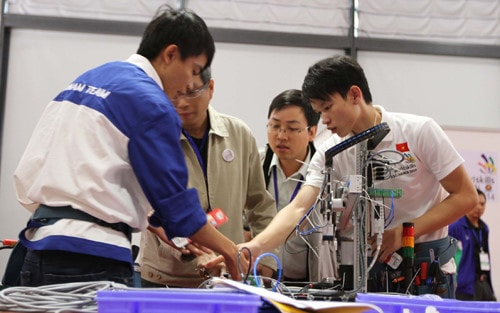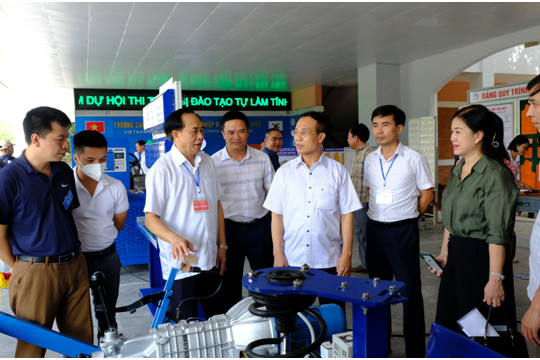Foreign enterprise salaries are high but not easy to 'eat'?
An engineer working at a foreign company who makes a mistake will be forced to stand in the midday sun or run a lap around the company.
After the Lunar New Year of Dinh Dau 2017, the rate of workers returning to work at enterprises across the country reached a high level: from 96-99%. This shows that the preferential policies for workers of enterprises towards workers have been effective. However, those are the figures for ordinary workers, but for workers with high skills and good capacity, retaining this force in the current and future integration period of the ASEAN Economic Community (AEC) is not easy.
 |
| Highly skilled workers are the choice of many foreign employers. Photo: Internet. |
According to economic experts, as soon as Vietnam joins the ASEAN Economic Community (AEC), the regulation of free movement of labor within the AEC bloc brings many opportunities and challenges for Vietnam. Allowing workers in 8 industries: Tourism, auditing, architecture, dentists, doctors, nurses, and caregivers to freely move to find jobs is an opportunity for Vietnamese workers to work abroad for high income. Vietnamese workers have every opportunity to find jobs in developed markets, such as: Singapore, Thailand...
Along with that, the Vietnamese market will also welcome high-quality labor from countries in the bloc to work. This labor shift will also cause many Vietnamese businesses to face difficulties in the face of the departure of highly qualified and skilled workers, while not all businesses are able to receive foreign workers.
Mr. Tran Viet Anh, General Director of Nam Thai Son Import Export Joint Stock Company, said: Labor transfer is completely normal, however, for each enterprise, whether or not employees leave depends on the corporate culture.
Mr. Tran Viet Anh said: In the past, his company had a number of workers, including engineers, who jumped ship to foreign companies. However, after a while, they returned to Nam Thai Son Company. What made them return was not low wages or high work intensity, but the attitude of the foreign company towards its workers: “A foreign company forced an engineer to stand in the midday sun when he committed a certain violation or made him run around the company.
The entire office block has a mistake of making them stand and work for 15 minutes. While Vietnamese enterprises never do this to their employees. Because most foreign enterprises look down on Vietnamese workers. They exploit them to the point of using everything. They may be willing to pay very high salaries, but it is very difficult to get that salary.
It is worth mentioning that Vietnamese enterprises are in a situation that has been warned for many years: Vietnam lacks a lot of specialized and fully trained human resources. Therefore, not only Vietnamese enterprises but also foreign-invested enterprises investing in Vietnam are very short of highly skilled human resources. To meet the job requirements, foreign enterprises have had to spend money and time to retrain workers when recruiting.
Therefore, when the labor market is free to move, Vietnamese workers need to improve their skills to meet the requirements of businesses in the ASEAN Economic Community (AEC). Without ensuring expertise and skills, it is very difficult to access good jobs with high salaries in today's competitive labor market.
Mr. Nguyen Phuc Khoa, Deputy General Director of Saigon Trading Corporation (Satra) said: “We have had time to prepare human resources, but we have prepared almost nothing. When the labor market opens, around us there are many countries with very good experts and very good human resources. Obviously, when there is free competition in the labor market, those who are not qualified and not qualified to work will be fired from the labor market.”
For a business to develop, there are three important issues: open policy mechanisms, ensuring capital and stable human resources. In the current period, when the Government is trying to create the best conditions for businesses in terms of policy mechanisms and capital, the most important concern is human resources.
According to Mr. Huynh Van Minh, former Chairman of the Ho Chi Minh City Business Association: the whole country is striving to have 1 million businesses by 2020, so it needs 1 million CEOs to build brands, orient and manage businesses. This force needs to be prioritized, and training needs to start now. If there is no good policy to retain CEOs, Vietnam will suffer a brain drain, and good CEOs will move to work for businesses in the ASEAN economic bloc.
Mr. Huynh Van Minh affirmed: “Vietnam’s brainpower has begun to flow from ASEAN countries. Pilots have the right to fly to airlines. Workers have the right to work in businesses within the bloc, if they can speak English, Japanese, or Thai. Obviously, we have to pay attention. If we want to have a fast CEO force in a short time, we have to pay attention to training and socialize the training of entrepreneurs.”
Economic experts say: The free movement of labor is a competition for labor quality of each country. Vietnamese labor will face competition with labor from other ASEAN countries right in their own country. Therefore, along with the systematic training of human resources from the State, Vietnamese laborers themselves must compete with each other by improving their skills, techniques and working style to be truly professional./.
According to VOV
| RELATED NEWS |
|---|


